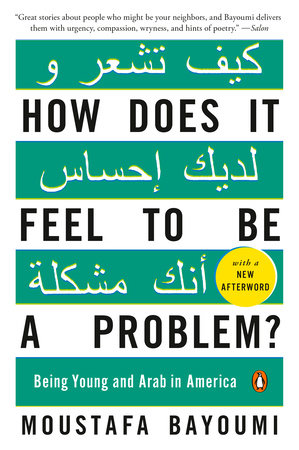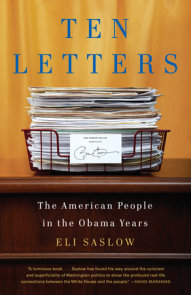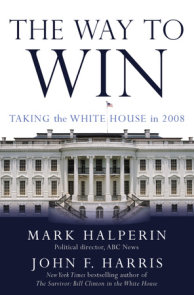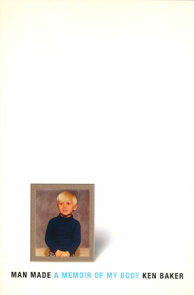READERS GUIDE
Questions and Topics for Discussion
INTRODUCTION
Just over a century ago, W.E.B. Du Bois posed a provocative question in his classic The Souls of Black Folk: “How does it feel to be a problem?” Now, Moustafa Bayoumi asks the same question about a new “problem” in the United States—and relies on seven young Arab Americans to provide the answer.
America has an unfortunate history of singling out large groups of people and branding them as, quite literally, personae non gratae. The scourge of slavery, abuse of Native Americans, and the internment of Japanese Americans during World War II are just a few instances in which racism and cultural biases were accepted by fellow citizens and, in some cases, even sanctioned by the government. In How Does It Feel to Be a Problem?, Bayoumi introduces us to a selection of young men and women who have found themselves part of the newest suspect class in the United States, a group that—following the 2001 terror attacks and the wars in Afghanistan and Iraq—went from simply invisible to being regarded with suspicion and even actively pursued. Centered in Brooklyn, New York, How Does It Feel to Be a Problem? offers a glimpse into the often-ignored struggles a group of twenty-something Arab Americans face—from discrimination in schools and workplaces to the horror of being arrested and thrown in jail without having committed a crime. But more than a catalog of mistreatment and discrimination, their stories are filled with hope, drive, and the pursuit of a better life. It is their striving and perseverance that might, eventually, help our country repair the damage it has inflicted on these young people and their families. As it has with the other groups that have been seen as an inconvenience to the United States, time will ease tensions. Eventually, Arabs and Muslim Americans will be viewed as just that: Americans. And not simply a problem that must be tolerated, obliterated, or solved.
ABOUT MOUSTAFA BAYOUMI
Moustafa Bayoumi was born in Zürich, Switzerland, and raised in Canada. He earned his Ph.D. at Columbia University and is an associate professor of English at Brooklyn College, the City University of New York. He is coeditor of The Edward Said Reader, and his essays have appeared in The Best Music Writing 2006, The Nation, The London Review of Books, The Village Voice, and other publications. He lives in Brooklyn, New York.
A CONVERSATION WITH MOUSTAFA BAYOUMI
Q. Have you kept in contact with the young people you interviewed? Can you update us on how they are doing?
The best part about writing this book has been getting to know the seven people in my book, and I still keep in touch with them as much as possible. Here’s where they are today. After waiting for so many years and suffering the trauma of detention, Rasha and her family were finally granted lawful permanent residency, and she is now continuing with her studies. Sami has finished his contract with the marines, has almost completed his degree in sports management, and will soon be looking to start his career. He no longer spends time with the Arab club on his campus. Akram did move to the United Arab Emirates, where he is currently thriving. He’s already been promoted, from English teacher to supervisor, and I joke with him that he’ll soon be their first Palestinian Minister of Education. Rami is extremely busy juggling several new part-time jobs and finishing his degree. The demands on him have increased substantially because his father was finally deported to Jordan. Lina is living peacefully in Virginia and has just had another baby. Omar gave up his dreams for a media job, but landed other full-time work with the City of New York. He had a big, splashy wedding last summer. And Yasmin, as promised, is now in law school. She has also started her own Facebook group: Yasmin for President in 2032!
Q. Who was most difficult to interview? In what ways?
It’s hard to say. Each person presented different kinds of challenges. Drawing out a story from someone’s past, as I did with Yasmin for example, was a different experience from sharing in a story that was still happening, as was the case with Rami or Omar. But if I had to pick one, it would be Rasha, whose story was clearly the most traumatic of the seven. Whenever we talked about her ordeal, I always made sure to have a friend of hers nearby to make her comfortable. She told me her story with steely determination, staring straight ahead the entire time and meeting my eyes only to emphasize a point, while each time her friend would be in tears. It was quite intense.
Q. One fascinating part of your book is your frank assessment of the Iraqi sanctions. It is a story that has not been reported as often as it should. What do you think would have been a better solution?
Sanctions that deny civilian populations basic food and medicine are clearly immoral. If you are going to sanction Iraq, then sanction the regime and not the people. Freeze overseas bank accounts of the leaders. Ban their travel outside their country. Outlaw military procurements.
In all honesty, however, we must recognize that sanctions against autocratic regimes never work. Look at Iran today. Cuba’s an even better example. A generation-long embargo hasn’t produced a counterrevolution against Castro. In these situations, the pain sanctions inflict is passed on to the people, and the regime is able to entrench its rule through patronage and by diverting the anger of the people onto an external foe. Sanctions are most effective against nations with thriving civil societies who feel the international isolation. This is what happened in South Africa.
More fundamentally, I never would have supported Saddam Hussein in the first place. He was, of course, a darling of the United States for many years, using not just chemical weapons but American-made munitions against his own people. Franklin D. Roosevelt is reported as having referred to Nicaraguan dictator Anastasio Somoza as “a son-of-a-bitch, but he’s our son-of-a-bitch.” It is precisely this approach that for so long has characterized (and continues to characterize) U.S. foreign policy and that invites all kinds of present and future disasters. Instead, the United States ought to pursue policies that fulfill the legitimate aspirations of peoples around the world, while protecting essential human rights and preserving the use of force only for when it is absolutely necessary for self-defense.
Q. How would this story have been different if you had gone to Dearborn instead of staying in Brooklyn?
Dearborn is about a third Arab American, so setting the book there would have had the effect, I think, of making the book seem more parochial. It would have felt very specific to the uniqueness of Dearborn and its politics, for better or worse, and the issues would probably have played out differently. By contrast, no single ethnic group dominates in Brooklyn, which is one of the wonderful things about the borough. The whole world is here, and everyone has to learn how to learn how to live in close proximity of the other if we are all to succeed. That’s why I think Brooklyn represents what is to come. After all, the Census Bureau estimates say that within a generation, by 2042 (revised from 2050), the country will be majority minority, that is to say, non-white. I like to say that Brooklyn today is the United States of tomorrow (but, thankfully, without a foreign policy!).
Q. How do you think history will characterize America’s treatment of Arabs and Muslims?
I believe we will come to see this period as being gripped by a similar kind of mass hysteria that fueled the Palmer Raids and Japanese Internment. What’s depressing is that this would happen in our post Civil Rights era, when I thought we would have learned from the mistakes of the past.
Q. Have you been at all surprised by reactions to your book?
That’s where things are more encouraging. Since the book was published, I have been receiving several emails every week from people telling me how moved they were by the book and how important reading it was for them. People describe to me how they’ve found themselves so engrossed in the book that they’ve missed their subway stop or found themselves unexpectedly crying or laughing out loud. From Arab and Muslim Americans, the response is often one of gratitude, thanking me for expressing just what they have been feeling over the last seven years. This is obviously very gratifying to me, and it makes me feel like I’ve succeeded in what I set out to do, because I wanted each of the stories to be both unique and universal at the same time. The general feeling from all the comments I’ve received, not just from Arabs and Muslims, is one of constructive outrage. People are upset that these things are happening and that they haven’t heard enough about them. They all want to work towards a more equitable society. Naturally, there are haters, too. Just last week, for example, someone wrote me wishing me ill and saying that he hoped that in the future Brooklyn College will hire people who “actually do research and not go to Bay Ridge or Paterson, NJ, and ask a few questions of teenagers that have nothing to do with their lives.” Dealing with this sort of thing, a kind of abstract animosity that often vents very personal insults on me, has also become part of my life, but mostly I just ignore it. It doesn’t really bother me very much.
Q. I am certain that many people do not realize they have preconceived notions where Arabs and Muslims are concerned. What aspect of your book do you think is most eye-opening for readers?
I think there’s a very simple principle operating in my book. You could call it recognition with difference. People discover that the characters in my book are very much like themselves, except for the fact that they have these extra burdens to carry, such as immigration detention, workplace discrimination, and profound questions of identity in a time of war. One might believe that the characters’ differences from the mainstream, such as wearing a hijab or a kaffiyah, are what entrances most readers, but I don’t think so. Rather, I think it’s the ordinariness of the characters. The relentless repetition in the popular media that all Muslims and Arabs are potential monsters means that the ordinariness of these young people and their simple human vulnerabilities are actually very meaningful and oddly surprising.
Q. How does the supposition that Barack Obama is Muslim that surfaced during the presidential campaign fit into this story? Do you think his administration might be able to alleviate some of the negative impact on Arab Americans?
The presidential campaign was eye-opening, proving just how pervasive anti-Arab and anti-Muslim sentiment is today. On the one hand, you had the Obama campaign running away as fast as it could from any hint that Obama was anywhere connected to Muslims. His website listed the accusation that he was a “secret Muslim” as a “smear,” as if there is something horrible about being Muslim. The McCain campaign was even worse. The Arizona senator repeatedly talked about the United States not as a multi-faith country, but as a Christian nation. He constantly invoked the “Judeo-Christian” values of the country in a manner that left not just Muslims but Hindus, Buddhists, atheists, and many others out in the cold. Confronted in a town hall meeting with a woman who claimed she couldn’t trust Obama because she had heard he was “an Arab,” McCain shook his head and reassured her. “No Ma’am,” he said. “He’s a decent family man, a citizen,” as if being an Arab was the opposite of being a decent family man or a citizen, even! Neither candidate stepped foot in a mosque during the campaign, though they did visit churches and synagogues. This all goes to show how, more than any other group today, Muslim Americans have become politically radioactive and beating up on Arabs is politically expedient. I hope that the situation will improve under an Obama administration, and I expect it will to some degree. But we have also arrived at a moment in our history where you cannot separate Arab American issues from Arab issues. Our situation here, in other words, is directly dependent on what happens in the Middle East, so there is yet another imperative to find just solutions to the conflicts of the region, the Palestinian question above all. Overseas wars, in other words, threaten the human rights of many people abroad and our civil rights here at home—not just the rights of Arab and Muslim Americans but the rights of all Americans. We need to conclude those wars with wisdom and justice.
Q. What are you working on now?
The book has kept me very busy since its publication. Just this week, to give you an idea, I will be on a panel in New York commenting on what the Obama presidency means for the Middle East, talking to a university audience in Pennsylvania about the future of Islam in the United States, and leaving for England to present the book at London’s School of Oriental and African Studies. In many ways, this broad interest is exhilarating, because it shows me that there is a hunger for knowledge and awareness that my book seems to feed. The problem is that, combined with my full-time teaching, I haven’t been left with much time to begin other projects yet. I do have one that I’m set to begin, however, and another in the planning phase, so please stay tuned!
DISCUSSION QUESTIONS




















